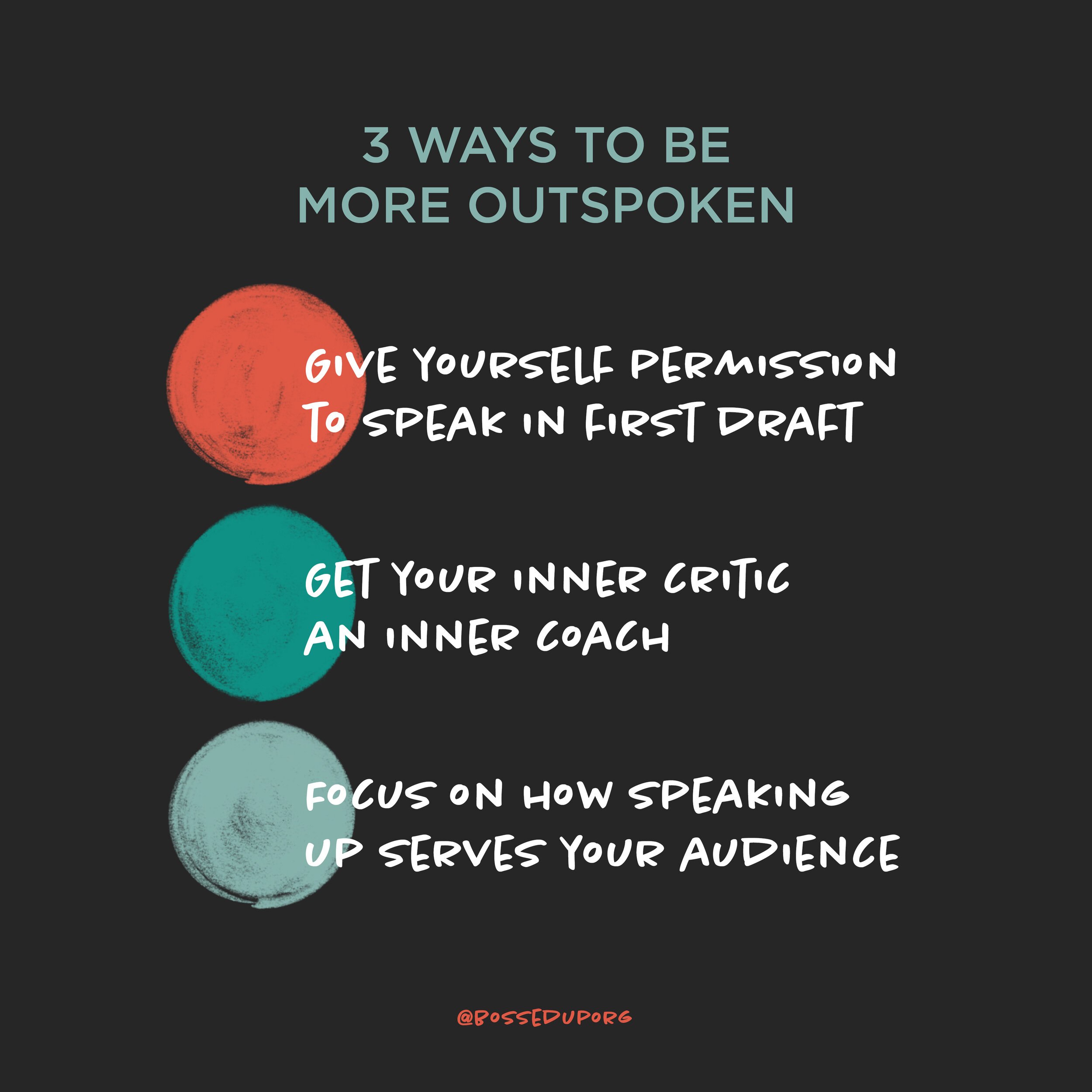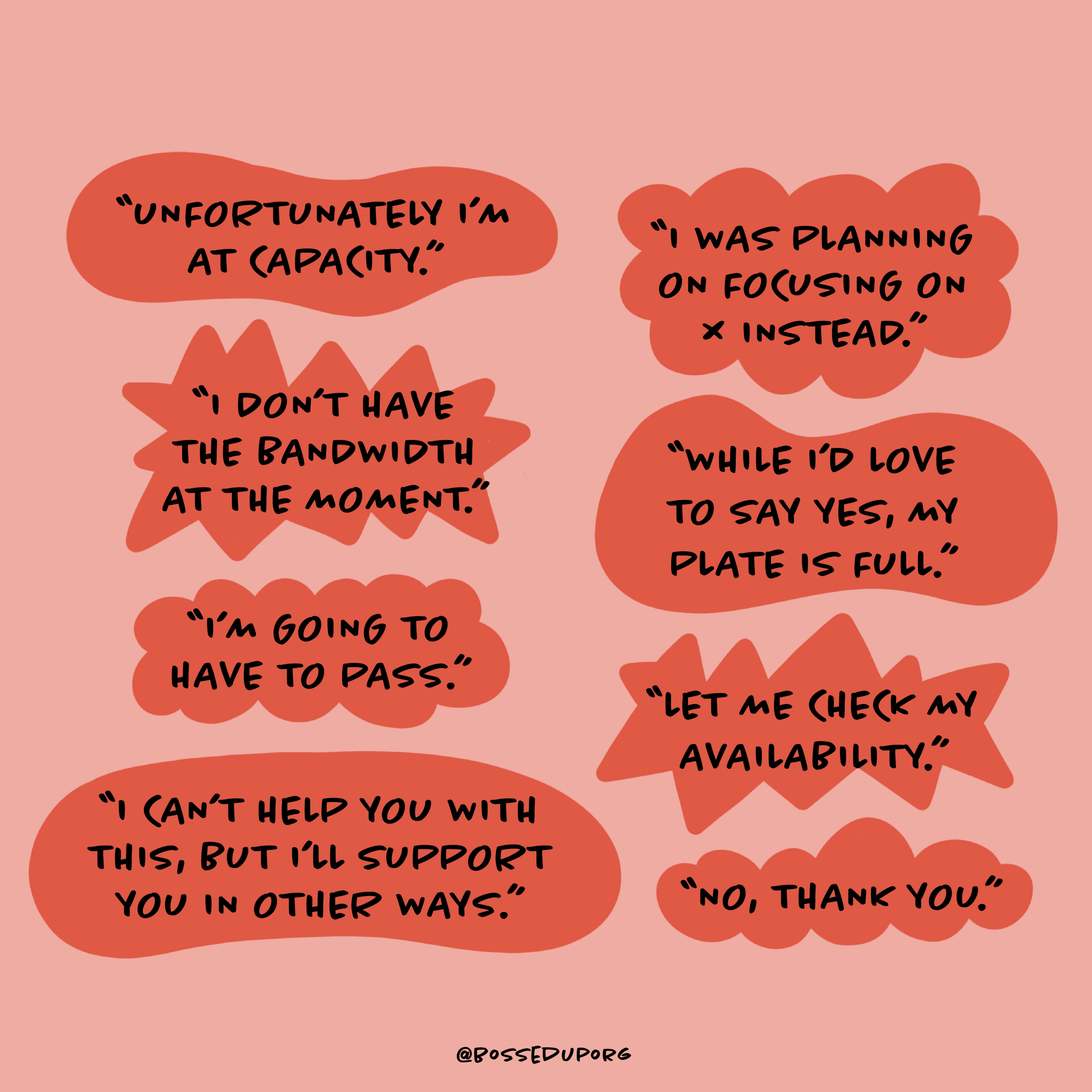3 Ways to be More Outspoken
Episode 299 | Author: Emilie AriesHave you ever had something important to say - but you stayed quiet instead?
Researcher Deborah Cihonski conducted a study in which she asked young girls this very question and found that this habit - labeled “loss of voice” - first appears disproportionately among girls in adolescence and can become an easy lifelong habit.
It’s no surprise. Our world has long encouraged women to be seen and not heard. Even back in Aristotle’s day you can find his proclamation that, "silence is a woman's glory."
Still today, staying quiet is reinforced for women and girls throughout our lives - both positively and negatively. Little girls in school are praised for sitting still and remaining quiet and calm. Outspoken women are often chastised as loud, angry, harping, or shrill.
These messages - both in media and in our own lived experiences - add up to a clear, internalized message: that as a woman, you’re better off saying nothing than speaking up and ruffling a few feathers along the way.
It’s time to reclaim our voice. If we are to solve the big problems facing our world today, we need all our human potential unleashed, and that means ensuring women’s voices are heard.
While there’s a lot of work that must be done to ensure all people are listening to women, we can start by turning up the volume on ourselves.
That’s why in today’s post - the third installment in my Get Yo’ Sh*t Together Series for the New Year - I’m sharing 3 strategies to be more outspoken in 2021:
Give yourself permission to speak in first draft
If you’re struggling to speak up off the cuff, you might be suffering from a form of perfectionism. Let’s say you want to chime in on a work conversation you overhear, but you’re not sure you have all the facts. You want to disagree with a proposal that’s floated in a meeting, but you’re not entirely sure of the best way to phrase your dissent. You want to say “no,” to the PTA parent who’s asking you to volunteer, but you’re just not sure what excuse you can use.
This is perfectionism that’s leaving you tongue-tied! You’re not sure how to speak up flawlessly, so you keep your opinion to yourself.
One of my recent Speak Up clients had a great tip for how to reframe this fruitless pursuit of the perfect clap-back: give yourself permission to “speak in first draft.”
If you’re not sure how to articulate yourself flawlessly, go ahead and radically grant yourself permission to proceed imperfectly instead. This doesn’t mean you must state your opinion as fact, but rather offer up your take as another perspective to be considered.
Now, it goes without saying that this becomes so much easier in an environment where psychological safety is plentiful, where you feel like minor mistakes won’t cost you your job. But even in high-stakes, decision-making conversations: speaking up imperfectly far outweighs the consequences of a bad plan being agreed to because no one’s pointed out the red flags.
Get your inner critic an inner coach
I spoke with author Melody Wilding on a recent podcast episode all about taming your inner critic and we agreed that sometimes we have to talk back to the inner voice of anxiety in our own minds. If you’ve got a backseat driver in your brain who’s constantly second-guessing your ideas and talking you out of taking risks, give her an inner coach to talk back!
Script some lines for your inner coach that’ll help you counter your inner critic’s go-to phrases. For example, if your inner critic likes to say, “Who do you think you are to speak up? You’re the most junior person on staff!” you can write a counterpoint for your inner coach to turn to. You might have her counter with, “I was hired for a reason. I’m being paid for my input. Don’t keep your ideas to yourself!”
Writing your inner critic’s arguments down can help you dismantle them, and remind you that there are other opinions to be considered. So make sure that your inner voice of doubt, anxiety, and worry are balanced by another voice - a voice of reason.
Focus on how speaking up serves your audience
The anxiety and stress of feeling like all eyes in the room are on you can make even the most confident speaker squirm. But experienced speakers know this essential truth: it’s never actually about you.
When you speak up and make your voice heard, you’re serving the others in the room. You’re sharing something you deem important for your team to consider. No matter how eloquently you add to the conversation, you’re adding something in service of others.
Don’t let common narcissistic tendencies fool you: making your voice heard isn’t just about hearing your own voice. At least it shouldn’t be. So focus on your message and the audience it’s going to impact. You are simply the medium through which that message will come to life.
Owning your voice and un-learning self-silencing can take time. So have patience as you push yourself to your growth edge in becoming more outspoken in the year ahead. Don’t expect perfection - but don’t let that deter you.
If you’re looking for more strategic guidance, tools, and training to own your voice like a boss, enrollment is now open for SPEAK UP, our 8-week assertive communication program.
It’s an interactive program, complete with weekly live practice sessions, that’s designed for the working professional who wants to become a more cogent, concise, and compelling communicator. And if you want to talk through your options, you can always schedule a free consultation call with a member of our team!
Next week, I’ll wrap up our 2021 Get Yo’ Sh*t Together series with a post all about how to say no.
Got a career conundrum you want Emilie to cover on the podcast? Call and leave us a voicemail NOW at 910-668-BOSS(2677).














Don’t let your good ideas go left unsaid.